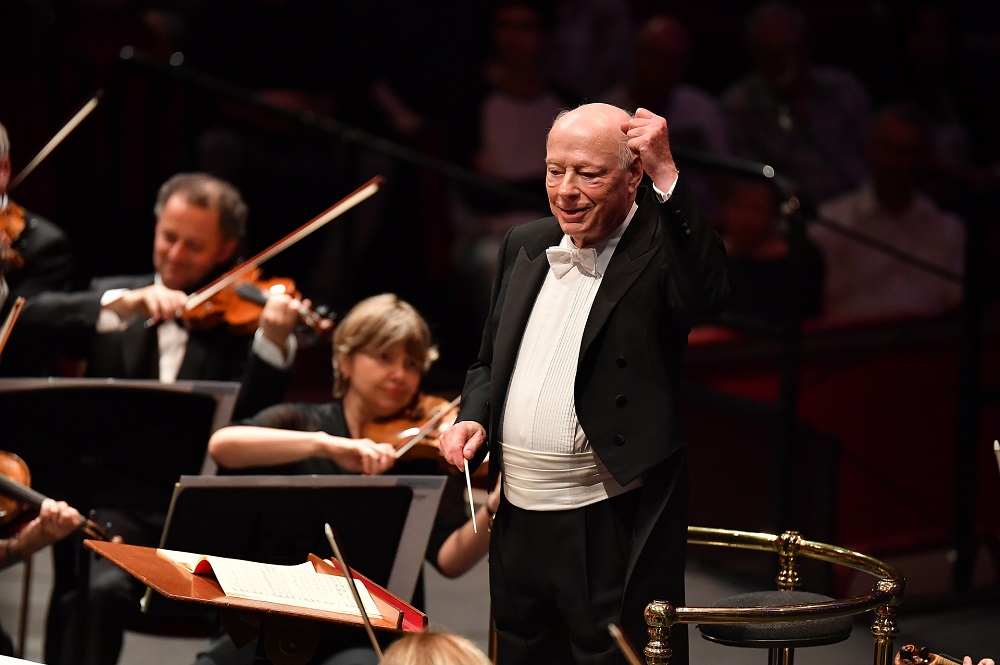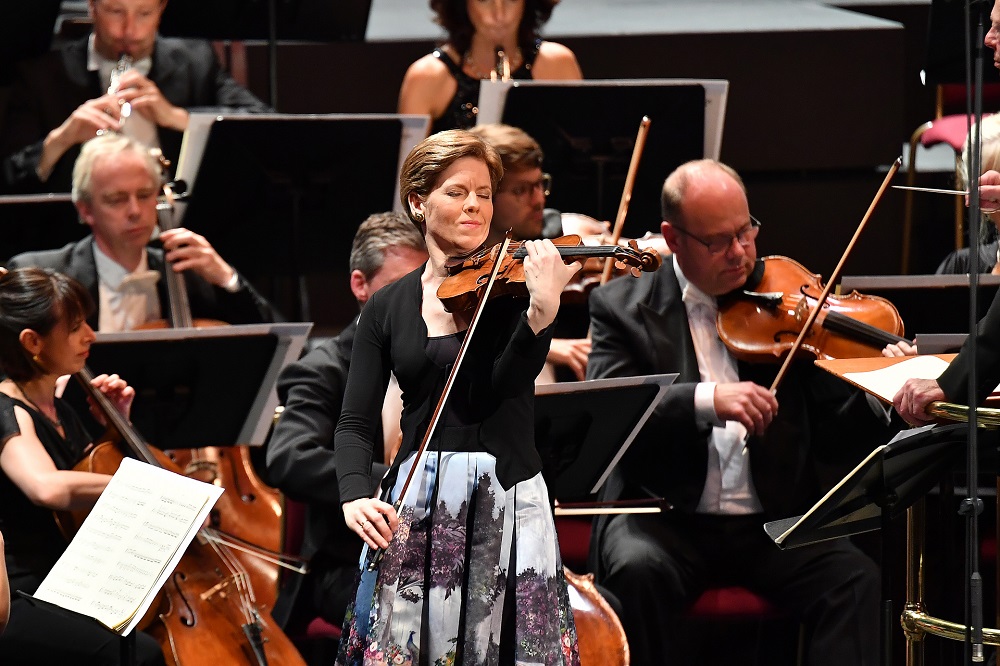Romantic concerto, contemporary work, classical symphony: it's a common format at the Proms, but not usually in that order. Both David Sawer's 1997 firework The Greatest Happiness Principle and Haydn's ever-radical Symphony No. 99, sharing a light-filled second half, would normally be reserved as what composer Anders Hillborg once told me is known in America as "parking-lot music", taking the opening slot.
Expectations ran high for this first performance of Julian Anderson’s piano concerto, and they weren’t disappointed. Taking its title from a book of the same name by Andre Malraux, The Imaginary Museum goes on a journey around the world over the course of its six movements.

A packed Royal Albert Hall on a Tuesday night for a programme of 20th-century English music. Have the nation’s concert-goers come over all prematurely patriotic? Is Holst’s The Planets really that much of a draw? Or could the crowds have more to do with John Wilson – the straight-backed, schoolmasterly figure at the centre of the musical maelstrom?

Ten days ago I reviewed the First Night of the 2017 Proms. Last night I was back at the Royal Albert Hall to hear the First Night of the 1966 Proms. This time-capsule experience was courtesy of a re-enactment of Sir Malcolm Sargent’s 500th Prom, in what turned out to be his final season. It gave an idea of Sargent’s musical tastes – middle-of-the-road classics and English music – and, in places, of his famously audience-pleasing conducting style.
When a trail-blazing orchestra takes on a world-transforming work, it would be pointless to leave the staid old rules of concert etiquette intact. Not only did the Aurora Orchestra under Nicholas Collon stretch their repertoire of symphonies performed from memory to cover the epic expansiveness and ear-bending innovations of Beethoven’s Third, the Eroica.
Nicola Benedetti was the star of this show, no doubt about that. She is a Proms regular and favourite, attracting a large and enthusiastic audience, the Royal Albert Hall filled almost to capacity.
The message must be getting through. On the First Night of the Proms, Igor Levit played as encore Liszt's transcription of the great Beethoven melody appropriated as the European Anthem; in Prom 2, Daniel Barenboim unleashed his Staatskapelle Berlin on Elgar's Pomp and Circumstance following an inspirational speech about European culture, education and humanism. Yesterday afternoon's manifesto was a given, showcasing the finest of all European bands under a Dutch citizen of the world who resided for many years in London. Bernard Haitink is also the world's greatest living Mozart conductor now that Mackerras is no longer with us - and at 88, his baton technique and his nuancing are more focused than ever in the love and passion they inspire.
You might argue that the Chamber Orchestra of Europe could play the programme in question without a conductor. But Haitink (pictured below) fine-tuned the dynamics in Mozart's "Prague" Symphony, No. 38, adding many more than are in the score, with a notably magical dimuendo back into the first-movement recap, and added his own subtle sense of space throughout, starting with the end of the slow introduction.
All repeats cried out to be heard with playing as hyper-alert and well sprung as this - and especially in Mozart's Andante, which Haitink now, surely, conducts more swiftly than he used to, making it a deeply expressive kind of minuet in a three-movement symphony where that ritual is officially missing.The woodwind playing was predictably both cultured and vivid, from Kai Frömbgen's very personal oboe solos to Clara Andrada's flute loudly protesting against the sudden ensemble rudeness at the heart of the finale.
Mozart's ubiquitous Third Violin Concerto might have seemed one-dimensional after that, a nice little exercise in 18th century gallantry, but not with another peerless artist, Isabelle Faust (pictured below), who as one-time COE member had to join her fellow violinists in the opening tutti. If from a distance in the Albert Hall you had to lean in to catch the nuances, that's no bad thing; and Faust's vibrato-light line in the Adagio was a delight. So was her choice of startling cadenzas by her frequent duo partner, pianist Andreas Staier, the last introducing a repeated pizzicato in homage to Mozart's use of it in a belated rondo-theme and carrying it over into the final fun and games.
No doubts, either, about any aspect of Schumann's Second Symphony – not an obvious second-half work – could possibly remain in an air-treading performance like this. The much-derided orchestration seemed perfect, with low horn notes cutting as much as the rest of the orchestra through the Albert Hall vasts. Haitink convinced us that this is one of the most miraculous scherzos ever written, so deft and sleight-of-hand in its transitions that you really wanted to applaud it and even call for an encore, as they did of old mid-symphony. The actual bonus, then, was apt, perfection again: the most gossamer-light dance through the Scherzo from Mendelssohn's incidental music to A Midsummer Night's Dream, proving that Haitink at 88 is still an ageless Puck at heart.
- Listen to this Prom on the BBC iPlayer for the next month
- Read more classical music reviews on theartsdesk
Next page: watch Daniel Barenboim's inspiring pro-European speech in Prom 2
The ideal First Night of the Proms sets the tone for the season, perhaps flagging up some of the themes to be followed up later, offering a blend of novelty and familiarity, and preferably ending with a roof-raising choral blockbuster. This programme successfully ticked those boxes, but took until the second half to really catch light.
The turnout in the Wigmore’s Kirckman series of young-artist showcases was unusually high for this 23-year-old Chinese pianist. With the Op. 28 Preludes of Chopin, it became clear that many of the audience had known what they were waiting for. Up to that point, Ke Ma had given the impression of another young Brahms-and-Prokofiev virtuoso.


